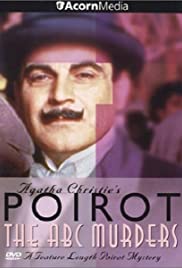
THE ABC MURDERS
A, 1992, 103 minutes, Colour.
David Suchet, Hugh Fraser, Philip Jackson, Donald Sumpter, Donald Douglas, Nicholas Farrell.
Directed by Andrew Grieve.
The ABC Murders is one of Agatha Christie’s best-known novels. It was filmed as The Alphabet Murders during the 1960s by the same company which made the Miss Marple films with Margaret Rutherford. It veered away from details of the novel. An American comedian, Tony Randall, was Poirot with Robert Morley as Hastings.
The BBC made a three-part version in 2018 which kept the core of the plot but veered away in many details, eliminating Hastings, killing off Japp, having what might seem an extraordinary background story for Poirot, played unexpectedly by John Malkovich, as a parish priest during the German invasion of Belgium in World War I, the effect on him raises doubts in his ministry, coming to England and becoming the celebrated detective.
This version is much more straightforward, one of the earliest of the 70 television films with David Suchet as Poirot and Hugh Fraser as Hastings, Philip Jackson as Inspector Japp
Poirot receives letters announcing murders in successive towns, starting with A, B, C, D. And the letters are signed ABC. Poirot investigates each case, challenged by successive letters. He visits the site of each murder, conducts interrogations.
The audience also sees a middle-aged man with an epilepsy background, going to watch thrillers of the cinema, door to door selling of stockings which is the initial clue as to the identity of the killer. After the last murder, the salesman is bewildered and gives himself up to the police. Good performance by Donald Sumpter.
A group of friends of the victims has gathered together to try to solve the case with Poirot and Hastings. Poirot gathers them together, highlights the fact that there is only one murder which benefited those connected – which means that the others were murders arranged to mislead and a chance encounter with the epileptic man led to the plan, the typing of the letters, giving him the typewriter, the stockings, and giving him orders, as if from the stocking company, to go to various locations – where the murders were committed.
1. The popularity of Agatha Christie’s novels? The film versions? With David Suchet as Poirot?
2. This classic status of this book? Other film versions? This version close to the novel?
3. The title, the letters to Poirot, the signature, the choice of the alphabet for the murders? The cover for the main intended murder?
4. Poirot and Hastings, friendship, collaboration and investigation, Hastings return from South America, the crocodile gift, the smell, the place in the apartment? And the final gift and story for Cust? Hastings staying with Poirot – and the washing up and drying up of the plates?
5. The letters, the challenge to Poirot? The wrongly addressed envelope and the consequences?
6. The involvement of Inspector Japp, Scotland Yard, his step-by-step investigations, lack of imagination, support of Poirot?
7. The first murder, the elderly later lady, her German husband and his protests? Her niece, in service, upset? The second murder, the young girl, waitress, her snobby employer, the sadness for her family, her strong-minded sister, the boyfriend, his lack of alibi, his anger? The third murder, the wealthy mansion, his wife and her cancer, her observations of Thora and the visitor? Franklin Clarke, friendly, welcoming, his involvement with the group and their investigations? Thora, the victim and his attraction, possible marriage? The fourth murder, the D, Cust at the film, the stabbing?
8. Poirot, the continued investigations, looking for clues? Hastings and his help? The visits to the various families? Going to Doncaster? Expectations? The races?
9. The question as to who would benefit from each murder? Targeting Franklin Clarke? The group together, the explanation, the recreation of the murders, the typewriter, the letters typed before it was sent to Cust, asking him to be a stockings salesman, each murder?
10. Cust, his mental health, seeing him at the cinema, his discussions with his landlady, going to Doncaster and not Cheltenham, the stockings, the cinema, the knife in his pocket, the blood, report to the police? His being apprehended? In jail, his epilepsy, his lack of memory? The gift of the typewriter, the stockings? His following orders? His mother saying he would be most famous – and the irony of his being innocent, the newspaper wanting interviews with him?
11. The ingenuity of the plot? The investigation? The clues? The solution?